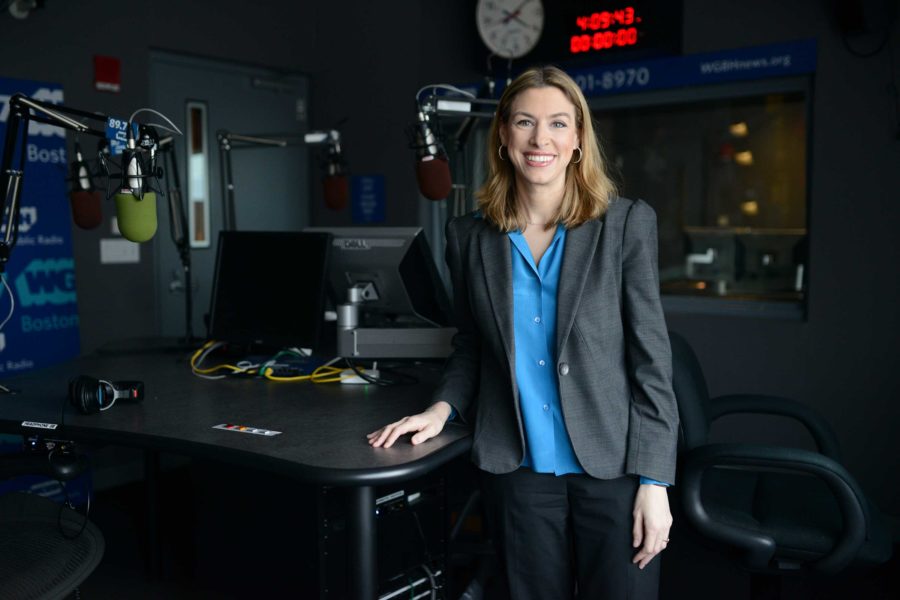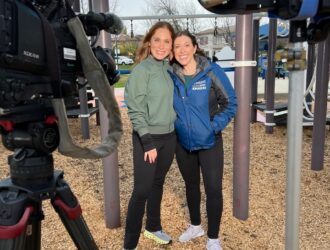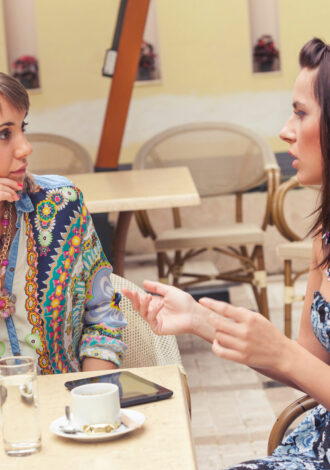Kara Miller, host and executive editor of WGBH’s Innovation Hub, interviews creative thinkers who push the boundaries of change in health care, education, tech, culture and more.
“This is a cool time to be focused on innovation,” she says. “The public sector is looking for unorthodox solutions to big problems, information is increasingly available to brilliant minds, and gaps in opportunity are forcing us to rethink the economy.”
With a PhD in English from Tufts University, Miller taught at UMass and Babson before launching Innovation Hub in 2011, taking it national in 2014 — it now airs on more than 100 public radio stations.
Exhale recently turned the mic for an engaging interview with Miller.

Exhale: The first line in your LinkedIn profile is “My daily diet is new ideas, and I love talking to smart people about them.” What new ideas have you personally adopted from some of those smart people?
Kara Miller:A lot! Listening to Michael Pollan, the food writer, talk about microbiomes in our gut and how good dirt is for us, how bad it is that society has become too clean, changed how I parent. After that interview, when something fell on the floor and my daughter picked it up and put it in her mouth I thought, “Oh, that’s okay, it’s good for you!” One of the most incredible things for me was my interview with Craig Venter, who sequenced the human genome. I now better understand how much of us is hardwired, how much of personality is innate.
I’ve become smarter by talking to smart people for seven years. For instance, I’ve learned the importance of working without distractions, that multi-tasking is counterproductive. After I tape a segment, I go back and listen to the raw segment on my computer. But, now I sit across the room, away from my computer, so I can’t check email or Twitter.

You’ve interviewed people from Weird Al Yankovic to Tom Friedman to Marissa Mayer. Who’ve been some of your favorites?
A really fun, favorite interview was Marc Wanamaker, a Hollywood historian, about the disruption talking films caused when they replaced silent films. Douglas Fairbanks and Mary Pickford were the silent-film Hollywood “it couple” of their day and they basically got divorced because one of them made it in talkies and one didn’t. All the musicians (who played music for silent films) lost their jobs overnight. It tore Hollywood apart and took awhile for the industry to adjust. I think of that as an example of the disruption that’s happening now.

Has your work inspired you to become an innovator?
The main thing I’ve created is this show. Over time, one thing I’ve gotten is a sense of how driven successful people are. Estée Lauder was super driven, maybe too driven. The drive to innovate often requires blinders that make it hard to pay attention to your family. Steve Jobs is Exhibit A. I love my work, but these stories remind us all to have a more balanced life.

In a world that is experiencing massive disruption brought on by tech innovation, how do you think your program can inform and guide your audience in acclimating to it?
Almost since the first day that the show aired I feel like no matter who I’ve talked to — in tech, business, scholars, almost everybody — they’ve brought the conversation back to education as the core issue for America to make the transition (brought on by tech-driven changes).
One of the things our show does is talk about what’s ahead of us in terms of skills required for future jobs. We’ve had lots of discussions about how vocational education can be improved. Another strain of suggestions I’ve heard from experts is to increase the level of creativity in public schools, making classrooms places where kids learn how to problem solve, because the jobs and lives people will be leading will require them to reinvent themselves over and over. Education is something we come back to quite often, because innovation is in everything and everywhere, in every field.

How has your own background as a woman in academia shaped what you choose for Innovation Hub and how you cover the breadth of innovation in Boston and beyond?
It’s shaped it a lot. I think of innovation as a very broad thing, not particularly tied to science or technology. For instance, Milton Hershey was a great innovator, but his innovation was in the chocolate industry!
I love looking for people who are rethinking old systems in innovative ways. We did a segment with Katherine Benton-Cohen (Georgetown University associate professor of history) about how our current immigration system was invented 100 years ago, the conditions under which that happened, who was being kept out. It has fascinating applications to current immigration issues.
Locally, we recently interviewed the founders of Ministry of Supply, a clothing company success story (created by two MIT grads) that marries tech and fashion. The Museum of Science approached us to showcase local innovators, as part of their ongoing “Wicked Smart” exhibit, and they selected Ministry of Supply as the current exhibit. It’s our second collaboration with the museum.
What I’ve seen in Boston is academia doing a great job helping women from different labs connect and collaborate. It’s really exciting that women are playing such as big role in local biotech and tech companies.



 4 min read
4 min read


